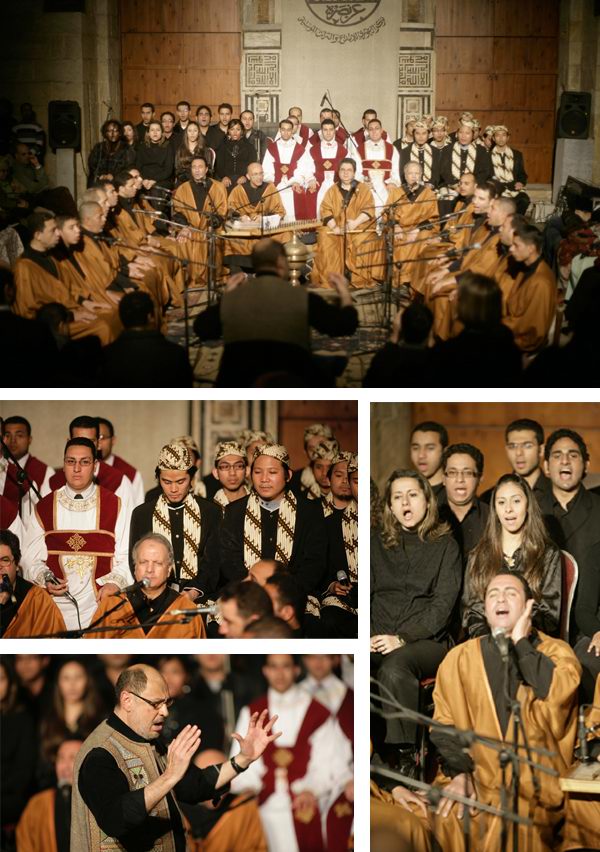Sacred ecstasy in a profane world
Saturday, March 06 2010 @ 08:01 PM CST Views: 517

Nevine El-Aref is swept away by the potent voices of religious chanters carrying their audience onward and upward
At the heart of Historic Cairo stands the Ghouri complex with its honey-coloured dome, mosque, palace, mausoleum, sabil (water fountain) and kuttab (Quran school). On Sundays visitors flock there from across the capital to attend performances of the Samaa Sufi Band and hear their message of peace.
The performances are proving popular with Cairenes. I heard of them through several different friends who described the concerts variously as "superb", "magnificent", "distinguished", "mystical", or "raising the sense of nationalism". Others described them as "a real messenger of peace".
In spite of the hype, I was not really enthusiastic about going to hear the band, and even though it was the first time for me to see a performance like this I expected it to be about as boring as a lesson coming at the end of a school day or a staged show with an in-your-face peace message and not much more. Besides, this is not the first time I have asked myself how chanting can be an essential means to launch a message of peace to the whole world. And, how does it show the unity of the Egyptian nation with its different religious beliefs from the ancient Egyptian era up to today?
Under the Ghouri dome, so skillfully- ornamented with a very fine style of wooden ceiling embellished with gold and coloured foliage patterns, 17 munshids (chanters) of the Samaa Sufi Band, each in a brown abaya, a loose gabardine gown and the traditional garb of Sufis, were on stage. Before them stood two large silver incense burners, and behind them sat 24 singers from three musical ensembles: the Coptic Hymns Band, the Indonesian Chanting Band and the Church Hymns Band (the Acappella Choir), each with their traditional costumes and musical instruments.
I experienced a sense of serenity as the powerful voices of the young munshids filled the night air of the Ghouri dome with divinity, praise and devotion. The influential lyrics and spiritual music evoked varying emotions in the audience. Some closed their eyes and lowered their heads, others wept to hear Sufi mantras praising the Prophet Mohamed, while yet more cried out "Allah! Allah!" A serene smile had settled on the faces of some, while there was clapping to the rhythm of the copper church rattles. They were scenes that afforded a glimpse into the power and majesty of a tradition that is all but extinct, the art of religious reciting and chanting.
Listening to these powerful voices as they make their way heavenward was, for me, a unique experience. Their talent is apparent in the fusion of different modes of religious chanting, forming one distinguished and very harmonious symphony. With the rhythmic beat, the spectators were carried from one mood to another; from madih al-rassul (praising the Prophet Mohamed) to taranim kanaesseya (church hymns) and the very enthusiastic, national songs of the renowned early 20th-century singer and composer Sayed Darwish. Passion has even taken its toll on some audience members as the voices became louder and louder.
"This is Egypt," tour guide Rafeya Moukhtar called out. "This is my personal message to all foreigners," Moukhtar, who is also responsible for the Heliopolis Community Activity Association, said that such performances reflected the real essence and spirit of Egyptian society. Despite their dissimilarity, whether in religion belief, character, thought, living standards and personal communities, they live together -- for the most part -- in unity and peace.
"This is the magic of Egypt," said an 80-year-old spectator at the end of the performance. He, too, had come to the Ghouri dome for the first time, and to hear such fantastic voices and such a performance summed up, for him, the saying "Egypt is the mother of the world."
"It teaches nations not to lie or cheat and to live in peace," he added.
For Gihan El-Sheshini, an arts professor at Ain Shams University, the sight of the Ghouri dome filled with joy inspired a strong spirit of belonging. She hoped that the performance could be repeated in schools and universities all over Egypt in an attempt to spread a message of peace. "It really is a heavy musical meal, but very delicious," El-Sheshini said.
"It's a unique meeting of art, combining voices that unite and melt together in one spiritual moment," said Entesar Abdel-Fattah, director of the Ghouri dome Creativity Centre. "To add an operatic touch I inserted the fourth movement of Beethoven's Ninth Symphony, which reflects the composer's wish to bring about a happier world, and I blended it in the frame of Sufi inshad."
In focussing on notions of peace and love, Abdel-Fattah wished to incorporate religious musical styles from 12 different countries on five continents, such as Byzantine hymns and the Gospel choirs.
Perhaps it is almost possible to believe in the possibility of peace and harmony in a better world. We do need more bands like Samaa Sufi.
ahram.org.eg









Story Options